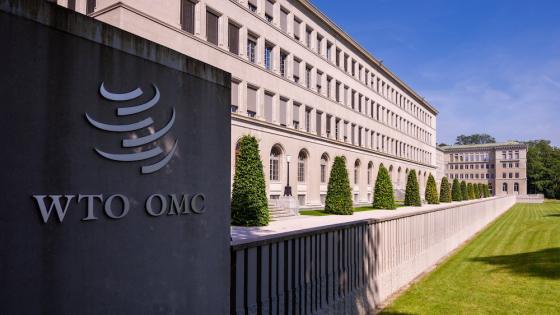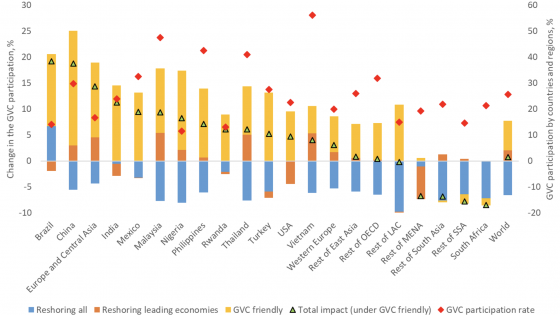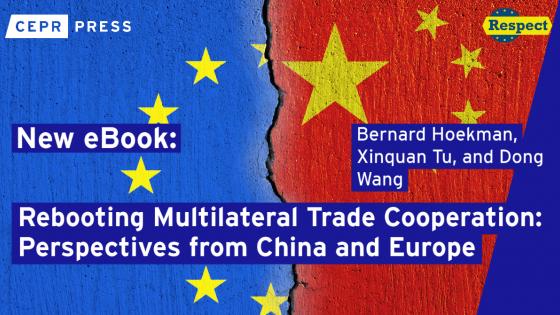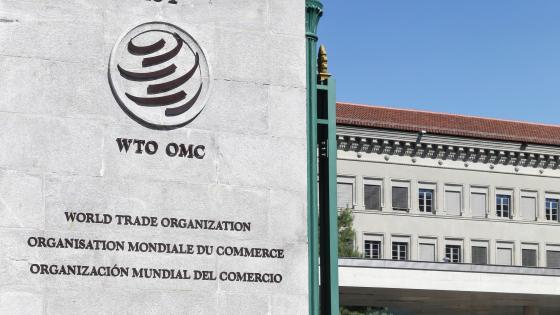The WTO is struggling – as many have pointed out (Wolff, 2022, Srinivasan 2020, Gao 20021, Hopewell 2021). It’s easy to understand why.
Built around yesterday’s consensus to tackle yesterday’s challenges – the WTO is being pushed to breaking point by the entrenched disagreements of today. It will need reimagining if it is to rise to the 21st century challenges confronting humanity. And rise it must.
In a new paper, we argue that while hopes of a return to doing big multilateral trade deals or a full restoration of the WTO’s judicial system seem remote, a WTO reinfused with resources and political energy is nevertheless necessary to meet humanity’s greatest challenges (Baldwin and Grozoubinski 2022).1
Climate change, the pandemic, and persistent economic and social inequalities threaten untold millions of lives. While trade alone cannot solve these threats, we argue that viable solutions require more trade, and stronger multilateral trade governance. This means that world leaders must reimagine the WTO as critical to saving lives, not just livelihoods – a vital tool in the struggle against humanity’s existential threats.
We argue that world leaders should grant the WTO the status and resources it needs to rise to the challenges. This is what we call the ‘WTO rising’ imperative.
In our short paper, we focus on a few specific trade angles related to two of humanity’s grand challenges: climate change, and restoring the pre-Covid trends towards poverty reduction and sustainable catch-up growth in the Global South. Think of these as a challenge, and a transformation.
The challenge: Climate change and trade
When it comes to climate change, trade is simultaneously:
- a contributor – through the carbon footprint of moving goods and services vast distances between suppliers and consumers;
- indispensable – through the dissemination of greener technologies, the skills they require, and the capital they need;
- a potential risk – through regulatory arbitrage by firms using foreign producers to sidestep local sustainability measures; and
- vital to mitigation – through increased global resilience to localised production shocks caused by extreme weather and other climate change factors.
There is another interaction here. If global warming and biodiversity losses are to be mitigated, governments must energetically and aggressively change business as usual. Such climate-linked policies will create winners and losers. They will have trade effects. And that means trade partners will complain. Handling the resulting trade frictions in the form of WTO complaints will put an enormous strain on the WTO dispute settlement mechanism. How to fix this?
In an ideal universe, all WTO Members would unanimously agree a single, binding intergovernmental agreement providing clarity on the measures they consider appropriate in pursuit of climate objectives. This, however, is not to be seen in the tarot cards that lay before us. WTO Members are far too divided, and do not yet know the policy tools they will want to employ well enough, to tie their hands through new rules.
In the absence of a single, climate-specific rulebook, governments are likely to go their own way. Policies designed with the purest of intentions will be seen as distorting markets by some. This in turn risks retaliatory measures, especially if governments fall into competing to house a handful of politically attractive sectors, such as solar panel or electric vehicle manufacturing. Worse yet, if WTO rules are used to prevent policies designed to mitigate global warming or to adapt to its consequences, the credibility of the organisation could be undermined.
To avoid a cycle of retaliation and escalation that renders the cure worse than the disease, the WTO can, and indeed must, play a vital role in easing such frictions through its commonly overlooked but significant pillar: monitoring, transparency, and dialogue.
If leaders reinvest in the organisation, its established and authoritative committee structure and procedures offer the best hope for a multilateral space where new and contemplated environmental policies impacting trade can be transparently shared and openly discussed; where Members can raise concerns, identify distortions, and encourage the modification of measures that would unduly hurt their producers or consumers in ways that serve no environmental benefit.
Supported by a Secretariat enhanced with the resources and political mandate to engage more substantively, the WTO as an institution could support governments as they attempt to navigate the complex policy waters of a global fight against climate change.
The transformation: Telemigration and the services revolution
Covid-19 has devastated livelihoods as well as lives. A recovery is under way, but it is moving slowly and unevenly and is now imperilled by economic shocks arising from war in Europe. However, recent developments in international commerce offer hope through the rise of services trade, especially ‘telemigration’, which means international telework (Baldwin 2019).
Trade in goods has stagnated for a decade, but trade in services has not (Figure 1). Moreover, two of the three regions hardest hit by the pandemic – Africa and Latin America and the Caribbean – saw goods exports fall during 2011–2019 but saw service exports boom.
Figure 1 Export growth in goods and services Trade, 2011–2019, and 2019 export shares
Notes: Pandemic disruptions caused travel and transport services to collapse in 2019 and 2020. World goods trade and world services trade amounted to $17.6 trillion and $4.9 trillion, respectively, in 2020.
Source: WTO Trade in Commercial Services (WTO Stats), https://stats.wto.org/.
Digital technology is what opened the door to this transformation of the link between trade and development. A key concept is trade in ‘intermediate services’ – services that go into the production of things, but which do not get delivered directly to the clients. For example, legal research behind a court filing is an intermediate service, while the court filing itself is the final service.
Before the information and communication technology (ICT) revolution made it easy to coordinate complex processes over long distances, most intermediate services were undertaken domestically by the company producing the final service. Now, however, many intermediate services are provided by contract suppliers, increasingly those sitting abroad.
This is creating export-linked jobs for bookkeepers, forensic accountants, CV screeners, administrative assistants, online client help staff, graphic designers, copy editors, personal assistants, travel agents, software engineers, and the like.
Telemigration means more opportunities for some, but more competition for others. Governments are likely to push back with protection. We think the WTO should be tasked with exploring how inevitable tensions can be best resolved.
Specific recommendations
The measures we call for in our paper are not dramatic. The world finds itself in a situation where perfect is the enemy of progress. Rather, we focus on practical, politically achievable steps.
Recommendation 1: A revitalised WTO process for discussing climate-related disputes around trade policy
Together with the WTO leadership, Members must begin preparing the ground for climate-related disputes, and ultimately build new infrastructure – including a strengthened and better funded Secretariat – within the WTO for handling climate-related frictions via mediation, negotiation, discussion, and perhaps adjudication.
In doing so, leaders should consider, inter alia, the Trade and Environmental Sustainability Structured Discussions (TESSD) that are already ongoing at the WTO. Given their openness to non-participants, Members should positively consider engaging in TESSD meetings even if they are unprepared to formally join the initiative or contemplate any rules it may or may not produce.
Recommendation 2: A new regular meeting on trade and climate at the Climate Change Conference of the Parties (COP)
The climate and trade communities are siloed and separated. This should end. The WTO should be explicitly included in efforts to advance, amplify, and coordinate the climate rescue.
A high-level meeting, at every COP, with the WTO as a co-chair alongside the United Nations Framework Convention on Climate Change (UNFCCC) Executive Secretary or COP Presidency would signal from the very top that trade policy is an ally of the climate fight, and that climate is an indispensable consideration for trade policy.
Recommendation 3: An eminent persons’ group to consider the inevitable backlash to and development potential of telemigration.
An eminent persons’ group should be created to think ahead about how the WTO can anticipate and monitor the backlash, suggest updates to the rules-based multilateral trading system necessary to accommodate the rapid rise of services trade, and rethink the trade–development nexus and the WTO’s role.
Concluding remarks: The ‘WTO rising’ imperative
The WTO needs an infusion of the political capital to rise up to the challenges of the 21st century. Above all, a mindset change is needed. Leaders must recognise that the WTO is not just about commercial calculations best left to diplomats and trade ministers. It is about coming together to find ways of countering the challenges that endanger humanity. It is about saving millions of lives. It is about countering developments that threaten to lock billions into perpetual poverty. It is a place that requires head-of-state attention and the status to match.
We are arguing that G20 leaders need to perceive trade as part of the solution to humanity’s existential challenges. This is the ‘WTO rising’ imperative.
References
Baldwin, R and D Grozoubinski (2022), “Strengthening the multilateral trading system: The ‘WTO rising’ imperative”, forthcoming Ing, L Y and D Rodrik (eds), Indonesia's G20: New Normal, New New Technologies, Economic Research Institute for ASEAN and East Asia and International Economic Association
Gao, H (2021), “WTO Reform and China: Defining or Defiling the Multilateral Trading System?”, Harvard International Law Journal 62: 1–38.
Hopewell, K (2021), “Trump & Trade: The Crisis in the Multilateral Trading System”, New Political Economy 26(2): 271–82.
Ing, L Y and D Rodrik (eds) (2022), Indonesia's G20: New Normal, New New Technologies, Economic Research Institute for ASEAN and East Asia and International Economic Association (forthcoming).
Srinivasan, T N (2020), Developing Countries and the Multilateral Trading System: From GATT to the Uruguay Round and the Future, Routledge.
Wolff, A W (2022), “WTO 2025: Restoring Binding Dispute Settlement”, PIIE Working Paper No. 22-5, Peterson Institute for International Economics.
Endnotes
1 Parts of the materials in Baldwin and Grozoubinski (2022) have been presented to the Indonesian government, the G20's Presidency country. The final version will be published in Ing and Rodrik (2022).




